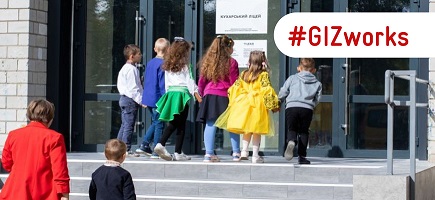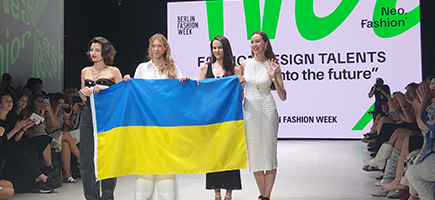

Security, reconstruction and peace: No reconstruction without health
Reconstruction is under way in Ukraine, for example to rebuild hospitals and rehabilitation centres.
Many hospitals in Ukraine are being tested to the limit by Russia’s war of aggression: in addition to the usual workload, they also need to treat traumatised and injured refugees. At the same time, air raids are damaging the medical facilities. Vasyl*, head of a hospital in Lviv, powerfully describes everyday life at the hospital: ‘We were working at around 85 per cent capacity during peacetime. The population in our hospital’s catchment area has now increased by 50 per cent as a result of the internal refugees. We didn’t know how to guarantee good medical care for all the people who needed it.’ Help has come in the form of a modular diagnostics centre – housed in a container that was able to be quickly attached as an extension to the hospital building and was set up by the Deutsche Gesellschaft für Internationale Zusammenarbeit (GIZ) GmbH on behalf of the German Federal Ministry for Economic Cooperation and Development (BMZ). Vasyl is relieved: ‘The diagnostics centre is equipped with modern instruments, enabling us to diagnose a great many different conditions quickly and to provide the necessary treatment.’
Across Ukraine, GIZ has so far built a total of around 230 health care facilities or improved the capacity of existing facilities by building extensions and procuring materials, including five modular hospitals in the regions of Chernihiv, Sumy, Zaporizhzhia, Mykolaiv and Dnipro. By adding containers, the hospitals can admit more patients and improve the health services for the population and internally displaced persons. A total of around 1.5 million patients benefited from these measures in 2023 alone. All the hospitals have modern medical equipment and laboratory instruments, such as ultrasound machines, which enables them to provide basic medical care for the population.

Unbroken Center: using know-how to defy the war
Dmytro* used to make orthopaedic shoes and corsets in Kharkiv, his home town. When the Russian war of aggression began in February 2022, he fled to western Ukraine, where the UNBROKEN National Rehabilitation Center, an orthopaedic technology centre in Lviv, offered him a traineeship to become an orthopaedic technician specialising in prosthetic legs. He took up the offer immediately: ‘I’ve always wanted to help people. When the war began, it turned out that this is where I was needed, because there are lots of patients who have had an amputation and lots of specialists are needed,’ says Dmytro.
In addition to numerous treatment options for patients, the UNBROKEN Center has one of the country’s largest workshops for prosthetic devices. On behalf of BMZ, GIZ has assisted in building and equipping the workshop, which opened in May 2024. The workshop also has a centre to train experts to produce and fit prosthetic and orthotic devices, which GIZ is supporting too. The centre is thus able to make and fit around 1,200 prosthetic and orthotic devices a year. ‘During training, I learned things about anatomy and biomechanics that not even our most experienced orthopaedic technicians know. This support means that we can help more and more patients,’ Dmytro explains.

Patients need to heal – both physically and emotionally
Many of the approximately five million internally displaced persons in Ukraine are traumatised when they arrive in the host communities. The city and region of Dnipro alone has taken in 474,000 internal refugees. GIZ has teamed up with partner organisations to provide support through a network of experts, who provide help over the phone or digitally to those affected. The focus is on groups that have been particularly affected, such as children and young people. To date, more than 3,700 children and young people have benefited from the psychosocial support arranged via GIZ in schools, over the phone or in community centres. In total, GIZ has helped provide psychosocial counselling for around 19,500 people since the war began, including in Dnipro. Here, GIZ works with Power of the Future, a Ukrainian NGO that is using creative conflict transformation methods to foster a spirit of community between the host population and the internally displaced persons and to provide psychosocial support.


